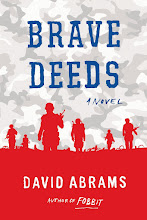All writers use them, but not everyone knows how to place them in a sentence in proper sequence and alignment. Like a pianist’s finger touching down on Middle C in the midst of an arpeggio, one word can make or break a sentence and could bring about the collapse of an entire story, or make it soar.
Ladies and gentlemen, Benjamin Percy knows exactly what to do with his words. Though surely he labors long and hard like the rest of us writers slicking our keyboards with sweat, Percy makes it all look so simple on the finished page. His words, his phrasing, his sentences come at us with unforced ease; and yet they vibrate with energy, and hit us in the right place at the right time. We never see the southpaw punch coming up on our blind side, but when it does, and after we're done reeling from the blow, we think to ourselves, “Wow, that felt good!” And then we whip out our highlighters and ballpoints to underline especially good sentences and scribble stars in the margins.
While reading his short story collection, Refresh, Refresh
I should state for the record that I certainly do not hate Benjamin Percy. In fact, I love his work and have spent the tail end of this year happily burrowed in all of his books: The Language of Elk
It is virtually impossible to turn away once you start reading any one of the short stories in Refresh, Refresh. Here, for example, is how “Crash” opens:
The doctor tells me a car crash at 60 mph threw Karen forward at 120 times her body weight. She remembered to buckle her seat belt so that means 1/10th of a second later she came to a stop. But her internal organs did not. They collided with her bones and broke open. Most people die right off the bat, the doctor says, but not Karen. Karen died minutes later.Like the eponymous wreck, it was impossible for me not to rubberneck a beginning like that. I spent a long time thinking about that woman who, by all outward appearances is fine--until she lifts up her shirt and sees "a purplish stain spreading across her distended belly."
I ask how many minutes later.
“Beats me,” he says. “No clue.”
He says probably she looked okay—probably she even stepped away from the wreck and said, “Thank God,”—but underneath her skin things bled.
His stories are set in central Oregon a land, he writes, that “looks like another planet. Mars maybe. The reddish blackish landscape is busy with calderas, cinder cones, lava blisters, pressure ridges, pressure plateaus.” That’s from “The Caves in Oregon,” which is essentially a haunted-house tale about a couple whose house is built over the mouth of a cave.
The realtor advertised the cave as a “natural basement with cooling properties.” In the living room there is an insulated steel door. Somehow, through the cracks around it, the breath of the cave finds its way in, smelling faintly of mushrooms, sulfur, cellar-floor puddles.
Percy’s timing is impeccable—he knows just when to make us laugh and when to make us flinch. There are moments, many of them, when our breath is stolen by a single phrase or a sentence such as “she will climb into the shower and leave behind a pink ring at the bottom of the tub as she did several months ago when she began to hemorrhage, when she lost the baby.” Or this startling, spot-on imagery: "the way her anger grows reminds him of an umbrella, a big red umbrella, suddenly sprung." That seemingly superfluous detail of its color is vital to the surprise of the sentence.
In Percy’s world, even minor characters are memorable—like Seth Johnson, “a no-neck linebacker with teeth like corn kernels and hands like T-bone steaks.”
The stories in Refresh, Refresh mostly center around boys making the rough transition to manhood, married couples struggling to stitch themselves back together after a tragedy, a father looking to set his daughter’s life on the right track (even if it means killing her abusive boyfriend). Percy’s characters—mostly all blue-collar workers—lead rough lives dotted with disappointment. They’re primarily seeking redemption, or forgiveness, or even just resolution, good or bad.
One of the most memorable stories, “The Woods,” served as the basis for Percy’s excellent novel The Wilding, just released this month. Both narratives open with a father pulling his son out of the house, insisting that he come look at something in the woods. In The Wilding, it’s a bear caught in a tangle of barbed wire; in “The Woods,” the bear is a cinnamon-colored deer which wailed in “a high-pitched sound that lowered into a baritone moan, like pulling in a trombone.” In both stories, the father instructs the son to kill the animal and put it out of its misery. This fumbled attempt to induct the boy into the world of men will echo for years.
To this day, some fifteen years later, when I lie in bed in a half-dream, the deer sometimes emerges from the shadows, snapping its teeth, retreating back into shadow as quickly as it appeared. To this day, I dislike the woods, I dislike hunting, I dislike my father.
Here’s another of my favorite passages showcasing Percy’s use of vivid imagery, this one from “The Killing”:
His daughter, Anne, lives in Salem, in the Willamette Valley, on the other side of the Cascades, where it rains more days than not and moss clings to the trees like a soft green armor. Compared to Central Oregon, it is another world entirely, so moist and gray, the sky, the sidewalks, as if you could punch your hand through anything and withdraw a handful of squirming worms.If, like me, you’ve ever lived in western Oregon, you know exactly what Percy is talking about—the wet, clinging air that leaves your entire day feeling damp; even your bedsheets are permanently moist.
Even though Percy transcends genre, a good portion of Refresh, Refresh hums with the dark tones of horror. One story, “Meltdown,” concerns a son who must learn to live with the fact that his father, the managing operator of a nuclear power plant, brought about the annihilation of the Pacific Northwest. It is both bleak and beautiful and easily stands with the best of post-apocalyptic lit like Cormac McCarthy’s The Road
It's the precise language of his details and imagery which makes his stories trigger such a visceral, synaptic response in readers. In “Whisper,” for instance, a hunter falls out of a tree stand while in the woods by himself and lies on the forest floor, immobilized by a broken pelvis:
Words like old and stupid and I wish cycled endlessly through his head and he began to shiver and rock with the pain, and when he did, the bone splinters branched out into his body like frost across a window. An artery snipped in half. His skin stretched suddenly and painfully against the pressure of blood trying to find a way out, his scrotum swelling to the size of an infant’s skull.Notice how just one right word choice—“snipped”—can make his writing burst aflame in our heads.
I know I’m probably exceeding my quote limit here, but when you’re as excited by a writer’s work as I am, then it’s hard to sit still, hands tucked under thighs, and not share the love. I’ve got one more chunk of beauty to leave with you—this time from the opening of “When the Bear Came”--and it showcases everything I've been trying to explain, how the words fall together in perfect alignment:
Nothing had happened in a long time. Every now and then someone wrecked a truck or got divorced or shot a six-point elk or dropped out of college or shipped off for Iraq or bought a thousand-dollar Lotto scratch ticket at the gas station—and you know how those kinds of things get around in a small town like Tumalo—but otherwise, the sand kept blowing, the bulls kept lowing, and the air kept on smelling like it always smelled, like juniper and sage. Irrigation pipes got moved around. Barbed-wire fences got mended. The occasional thunderstorm boiled over the Cascade Mountains and lit a barn on fire and flattened the alfalfa crop and eventually rattled apart into a collection of black clouds that made the sky look full of bears drinking from a big blue bowl. That’s about it.
Really, nothing had happened around here since the train came off the tracks and five of its cattle-cars rolled through the mini-mart, leaving behind a twisted snarl of lumber and metal from which bubbled soda pop and blood. That was five years ago. The only other thing I can think of is Josh Henderson, who they found at the dump, dead and apparently dragged behind a car—back and forth along a strip of county two-lane—his skin unpeeling against the asphalt in a long red trail that drew crows and magpies from all over the county. And that happened eons ago, before I can hardly remember.
There’s the train—there’s Josh Henderson—there’s the Deschutes County Fair and of course the weekend stock-car races and the fat-bellied trout that drift along the shadowy banks of the Metolious River and dozens more diversions, all tiny and meant to distract me from the big spell of nothing that had settled over Tumalo. So when the bear attacks began, things changed and that was just what I needed.














Wow, amazing writing, excellent examples of how to make magic with words woven in just the right texture and design.
ReplyDeleteJanet Muirhead Hill, Auther of the Miranda and Starlight series (www.ravenpublishing.net)
I came to visit your blog after reading in another one you really enjoyed Drinking Coffee Elsewhere by ZZ Packer (I loved it too! she's got a way with words & plot esp. dealing with difficult issues) and now I find you also review short story collections, yay! so will be following The Quivering Pen from now on.
ReplyDeleteGreetings!
Can't believe I missed this one, David.
ReplyDeleteGreat blog about Percy's exceptional collection-- Refresh Refresh is one of my favorites too.
Best,
Siobhan
Ben Percy plagiarized the story Meltdown from kiddofspeed.com
ReplyDelete